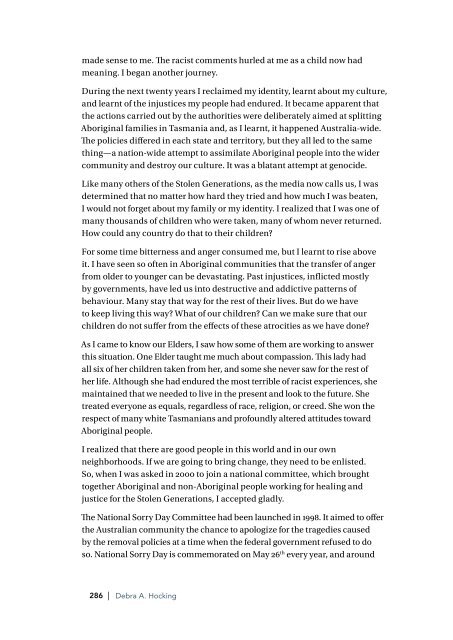Debra A. Hocking - Speaking My Truth
Debra A. Hocking - Speaking My Truth
Debra A. Hocking - Speaking My Truth
Create successful ePaper yourself
Turn your PDF publications into a flip-book with our unique Google optimized e-Paper software.
made sense to me. The racist comments hurled at me as a child now hadmeaning. I began another journey.During the next twenty years I reclaimed my identity, learnt about my culture,and learnt of the injustices my people had endured. It became apparent thatthe actions carried out by the authorities were deliberately aimed at splittingAboriginal families in Tasmania and, as I learnt, it happened Australia-wide.The policies differed in each state and territory, but they all led to the samething—a nation-wide attempt to assimilate Aboriginal people into the widercommunity and destroy our culture. It was a blatant attempt at genocide.Like many others of the Stolen Generations, as the media now calls us, I wasdetermined that no matter how hard they tried and how much I was beaten,I would not forget about my family or my identity. I realized that I was one ofmany thousands of children who were taken, many of whom never returned.How could any country do that to their children?For some time bitterness and anger consumed me, but I learnt to rise aboveit. I have seen so often in Aboriginal communities that the transfer of angerfrom older to younger can be devastating. Past injustices, inflicted mostlyby governments, have led us into destructive and addictive patterns ofbehaviour. Many stay that way for the rest of their lives. But do we haveto keep living this way? What of our children? Can we make sure that ourchildren do not suffer from the effects of these atrocities as we have done?As I came to know our Elders, I saw how some of them are working to answerthis situation. One Elder taught me much about compassion. This lady hadall six of her children taken from her, and some she never saw for the rest ofher life. Although she had endured the most terrible of racist experiences, shemaintained that we needed to live in the present and look to the future. Shetreated everyone as equals, regardless of race, religion, or creed. She won therespect of many white Tasmanians and profoundly altered attitudes towardAboriginal people.I realized that there are good people in this world and in our ownneighborhoods. If we are going to bring change, they need to be enlisted.So, when I was asked in 2000 to join a national committee, which broughttogether Aboriginal and non-Aboriginal people working for healing andjustice for the Stolen Generations, I accepted gladly.The National Sorry Day Committee had been launched in 1998. It aimed to offerthe Australian community the chance to apologize for the tragedies causedby the removal policies at a time when the federal government refused to doso. National Sorry Day is commemorated on May 26 th every year, and around286 | <strong>Debra</strong> A. <strong>Hocking</strong>
















